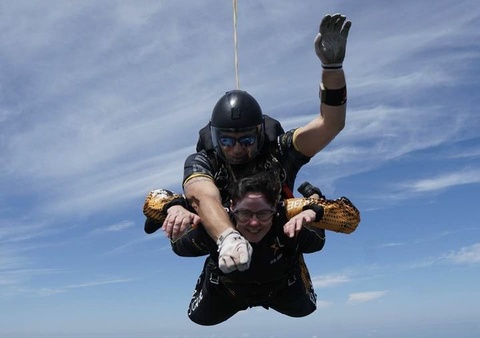By Alice Eberhart
Rosemary Moore, associate professor of instruction in the departments of History and Classics in the College of Liberal Arts and Sciences, brings her own leadership and military experience from the U.S. Navy into her classroom and her research on the Roman military.

Moore, who joined the faculty in 2003, teaches courses on ancient civilization, including warfare, technology, and culture. She also teaches classes on ancient Greece, Greek history, and Hellenistic Greece and Rome, among others.
“I really enjoy teaching,” Moore said. “It reminds me of some of my favorite parts of military service, working in a team towards shared goals. I see myself as a sort of leader in the classroom; Every instructor has to be.”
Moore’s research focuses on the Roman military.
“I focus on how lower ranks reacted to their commanders and how commanders tried to present themselves as trustworthy and competent,” Moore said. “This topic came directly from what I observed while on active duty.”
Moore was in the Navy for a little over five years. She served as an officer in the Integrated Undersea Surveillance System (IUSS), previously known as the Sound Surveillance System (SOSUS). From tracking active submarines to training on simulated sinking ships, Moore accomplished a lot during her service.
“We tracked submarines, ships, and many other things, such as whales,” Moore said. “The tracking of whales started after the Cold War ended in the late 80s, and the research that used this data led to some great findings, and research is ongoing. I also was an instructor/designer/division and finally department head for IUSS training at two separate commands.”
Some of Moore’s most exciting moments began during her Reserve Officers’ Training Corps (ROTC) in college. She graduated with an AB from Harvard College but completed her Navy ROTC training at the Massachusetts Institute of Technology.
Her training included rappelling down a 60-foot tower and using equipment meant to simulate sinking ships or aircrafts. Moore would also spend about half of each summer on board Navy ships or taking part in other training.
“I was on the USS Enterprise, an aircraft carrier, for about one month, and we were underway most of that time,” Moore said. “Watching flight ops from the side of the flight deck was really fun.”
After her training, Moore served at Naval Facility Argentia in Newfoundland for about two years. There, she led a watch team that detected objects, usually submarines, located and tracked them, and reported the data to higher levels. The data was used in many ways, Moore said, including intelligence analysis and by other operational units in the Navy.
Moore continues to connect with the military through the ROTC at the University of Iowa. She recently joined the cadet summer training at Ft. Knox, Kentucky thanks to Lieutenant Colonel Todd Kuebler, head of the Mighty Hawkeye Battalion ROTC Program and professor of military science. There she got to take part in training including rappelling, obstacle courses, and most excitingly, a tandem jump with the Golden Knights.

“I met many other higher ed professionals there and was really impressed to see the high level of fitness, team-working, and on-the-spot problem solving cadets must possess to pass this training,” Moore said, adding how ROTC gives students valuable skills whether or not they pursue a military career.
Moore said she enjoys being a faculty member in CLAS because public and community service are important to her. Her favorite part about teaching is meeting students with a wide range of interests.
“I enjoy being able to share something I love with them and seeing them realize how many questions they can ask and pursue,” Moore said.